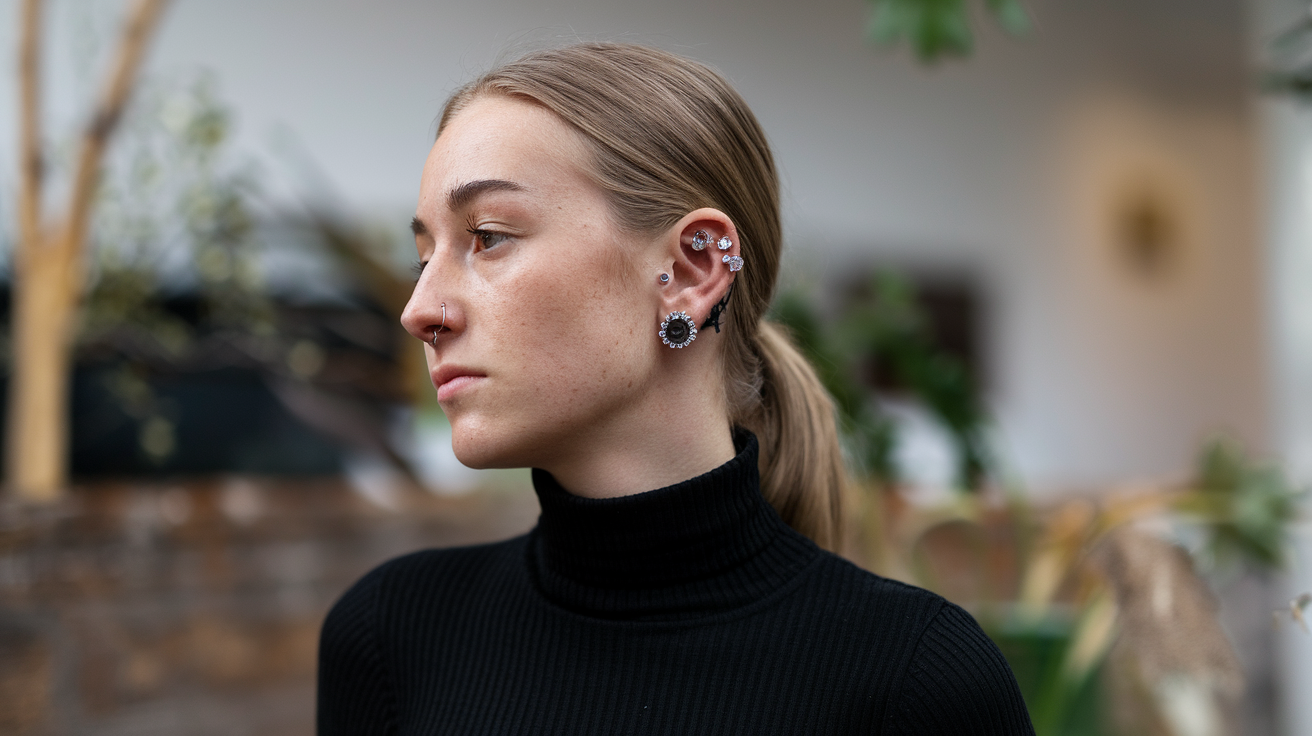Introduction:
Daith piercing is more than just a trendy fashion statement; it has grown in popularity due to its unique placement and potential health benefits. This ear-piercing style, pronounced “doth,” involves puncturing the innermost cartilage fold of the ear, creating an edgy and attractive look. While its visual appeal alone has drawn a dedicated following, the rise of daith piercing has also been fueled by its reputation for promoting wellness, particularly in alleviating migraines. This dual appeal makes it an intriguing choice for both fashion enthusiasts and those seeking alternative health solutions.
What is a Daith Piercing?
A daith piercing is a type of body modification that targets the small, thick piece of cartilage above the ear canal. Because of its deep placement, this piercing often catches the eye with its bold design. It is typically adorned with hoops or curved jewelry, which add to its distinctive aesthetic. While it requires a skilled professional to execute due to the location and sensitivity of the cartilage, many people are drawn to the uniqueness of this piercing.
The origins of daith piercing are somewhat mysterious, but its rise to prominence can be attributed to the blending of ancient body art traditions with modern fashion sensibilities. Today, Daith piercing is not only a sign of personal style but also a symbol of individuality and self-expression.
Why is Daith Piercing So Popular?
The growing popularity of daith piercing stems from a combination of aesthetic appeal and potential health benefits. On the style front, its discreet yet striking placement sets it apart from more common piercings, making it a favorite among those seeking something distinctive. The versatility of jewelry options, from sleek minimalist rings to ornate designs, adds to its charm and adaptability to personal tastes.
Additionally, the perceived connection between daith piercing and migraine relief has sparked significant interest. Many believe that the piercing aligns with an acupuncture pressure point associated with headache relief. While scientific evidence is limited, anecdotal accounts of reduced migraine frequency after getting a daith piercing have made it a popular choice among migraine sufferers.
The Procedure: What to Expect
Getting a daith piercing requires careful consideration and professional expertise. Unlike relatively simple lobe piercings, Daith piercing involves thicker cartilage and a more challenging placement. This makes it essential to choose a licensed and experienced piercer who uses sterile equipment to minimize the risk of infection.
During the procedure, the piercer typically uses a hollow needle to create the opening for the jewelry. While pain tolerance varies, many describe the sensation as a sharp pinch or pressure rather than intense pain. Because cartilage is less vascular than soft tissue, the healing process for a Daith piercing can take anywhere from three to six months, sometimes longer. Patience and proper aftercare are crucial for ensuring a smooth recovery.
Aftercare Tips for Daith Piercing
Caring for a daith piercing is critical to avoid complications like infection or irritation. Regular cleaning with a saline solution or a gentle, fragrance-free cleanser helps keep the area free of bacteria. Avoid touching the piercing with unwashed hands, as this can introduce germs and slow the healing process.
During the healing period, it’s best to avoid swimming in pools or hot tubs and to be cautious when brushing your hair or using headphones, as these activities can irritate the piercing. Sticking to high-quality jewelry made from hypoallergenic materials like titanium or surgical steel can also reduce the risk of an allergic reaction.
Daith Piercing and Migraines: The Connection
One of the most intriguing aspects of daith piercing is its potential role in migraine relief. The theory suggests that the piercing targets an acupuncture point related to the vagus nerve, which plays a role in regulating pain and other bodily functions. While there is no definitive scientific backing for this claim, many people report experiencing fewer migraines after getting a daith piercing.
It’s essential to approach this potential benefit with a balanced perspective. While some individuals find the piercing helpful, others experience no change in their migraines. Those considering daith piercing for health reasons should consult with a healthcare provider to explore complementary treatments and ensure their decision aligns with their overall wellness plan.
Choosing the Right Jewelry
The jewelry you choose for your daith piercing can significantly impact its appearance and comfort. Initially, a professional piercer will insert an essential piece that accommodates swelling during the early healing stages. Once the piercing has healed, you can switch to more decorative options, such as clicker rings, seamless hoops, or captive bead rings.
When selecting jewelry, prioritize quality over price. Hypoallergenic materials are essential to prevent irritation or infection. Titanium and surgical steel are popular choices for their durability and biocompatibility, while gold options offer a more luxurious look.
Style and Self-Expression
Daith piercing offers a creative way to showcase individuality and style. Whether you’re aiming for a subtle, understated look or a bold, statement-making design, the endless jewelry options ensure that the piercing can be tailored to your personality. It also pairs beautifully with other ear piercings, making it a versatile addition to your overall aesthetic.
Conclusion
Daith piercing is more than just a fashionable choice—it’s a statement of self-expression and, for some, a step toward wellness. Its unique placement and eye-catching appeal have made it a standout trend, while the potential for migraine relief adds an intriguing dimension. Whether you’re drawn to it for its stylish edge or its reported health benefits, a daith piercing is a decision that requires careful thought and commitment. By understanding the procedure, embracing proper aftercare, and exploring jewelry options, you can enjoy the many facets of this fascinating piercing.
